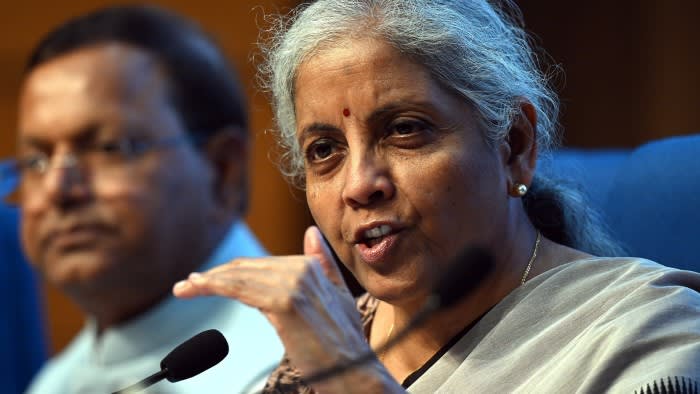Unlock the Editor’s Digest for free
Roula Khalaf, Editor of the FT, selects her favourite stories in this weekly newsletter.
India’s finance minister Nirmala Sitharaman has denounced the EU’s planned carbon tax on imports as an arbitrary “trade barrier” that will hurt the world’s fastest-growing large economy and other industrialising nations.
Sitharaman said the EU Carbon Border Adjustment Mechanism (CBAM), under which tariffs are to be levied from 2026, would impede developing countries’ transition away from fossil fuels by making the change harder to fund.
“They are unilateral and are not helpful,” Sitharaman told the Financial Times’ Energy Transition Summit India in New Delhi. “Absolutely, it is a trade barrier.”
“You are being stifled by steps which are not going to facilitate the green transition,” she added.
The CBAM is intended to penalise embedded carbon emissions from the production of goods imported to the EU such as cement, fertilisers, iron and steel, and chemicals. The tax, which was approved last year, has triggered alarm among India’s fast-growing heavy industries, which fear it could wipe out one of their biggest markets.
A report by the New Delhi-based Centre for Science and Environment estimated the CBAM would result in an additional 25 per cent tax on carbon-intensive goods exported from India to the EU, a burden that at 2022-23 levels would be equivalent to 0.05 per cent of the country’s GDP.
India relies on coal for more than half of its electricity generation and to directly power much of its production of goods such as steel.
New Delhi has also been riled by a controversial EU anti-deforestation law that will block foreign companies from exporting to the bloc if their products are deemed to have contributed to forest loss.
After widespread international criticism of the deforestation law, which was meant to enter into force in December, Brussels last week proposed a one-year delay to its implementation.
Sitharaman said India was on track to be a net zero carbon emitter by 2070, barring “unilateral” external challenges such as the EU carbon tariff and deforestation initiatives.
“That is another one of those steps which can hurt countries like India,” she said of the deforestation rules. “You will have major disruptions in the supply chain, that’s not going to help countries spending a lot on transition costs.”
Under the CBAM, exporters to the EU must register the emissions produced in creating their products, with charges kicking in from 2026. The EU is confident the measure would survive a possible challenge at the World Trade Organization because it applies to domestic producers as well imports.
Sitharaman said India had raised concerns with the EU “several times” and would do so again, but that she did not expect the issue to affect ongoing free trade negotiations with the bloc.
“I’m sure it won’t be escalated to the level of hurting the talks,” the finance minister added. “But our concerns will definitely be voiced.”
Ignacio Garcia Bercero, non-resident fellow at the Breugel think-tank in Brussels, said the EU measures were being taken to meet the global challenge of climate change and damage to nature, not for protectionist reasons.
“We are not going to meet internationally agreed global goals to stop deforestation unless importing countries contribute. Europe does not produce most of these commodities so it is not protectionist,” he said.
On CBAM, Bercero said the EU’s heavy industry was paying more for emissions and without the tariff would simply be forced out of business by cheaper imports from countries without a carbon tax.
Ngozi Okonjo-Iweala, the WTO director-general, told the FT last month that global carbon pricing was necessary, but that poorer countries should pay less.


